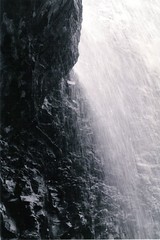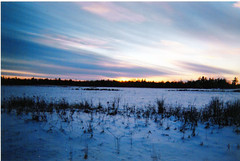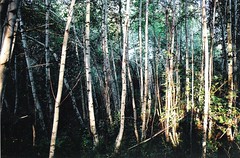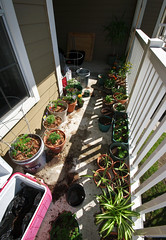Growing up, we had a garden. I’ve spoken of it before[1]. We never planted more than an acre (most places around us had at least a back 40 or so reserved for feed corn), but it was a proper garden, with corn, tomatoes, carrots, and rich dark earth. I didn’t spend much time in the garden proper (one venture into the tomato patch as a very young child, and the resulting realization I was surrounded by massive tomato/hook worms, was enough to keep me wary for some time), but I would spend hours chasing the leopard frogs that shaded themselves in the tall grasses at the boundary of the garden and the lawn. It accounts for a good part of my adult inclination toward nature and green growing things. Over time, we let it go fallow, but its earlier vibrant colors and rich smells still fill a small corner of my mind.
I was lucky to go to college in a small town with an abundance of nature around it. A vast valley, an on-campus arboretum, waterfalls and grand gorges provided enough opportunities for outings that the transition from living in a sprawling (if decrepit) country manor on hundreds of acres of land to a small 12X12 dorm room didn’t feel too stifling. I did miss green growing things, but, as with most college men, my thoughts were more occupied with other more pressing concerns. Fruits of the vine still figured prominently, but not quite in the same context.
Fallbrook, Geneseo, NY
Letchworth Gorge, near Geneseo, NY
I bought two plants that freshman year of college. One of my friends was in a botany class, for which they sold plants as a fund raiser. The spider plant, a species which I was convinced until recently could survive full-on nuclear war, was the only one alive after the first year.[2]
Over the years, that spider plant begat, as spider plants are wont to do, a host of other spider plants. I kept some, and gave many others away. However booming , my spider plant cultivation was pretty much the sum and substance of my plant-rearing all the way through graduate school.
In the intervening years, I have not owned land or a proper garden. Grad school was another small apartment, and moving to Houston meant more of the same. Our indecision on whether to stay or not has resulted in living in an apartment for seven years now, while all our friends have moved on to cookie cutter starter homes in suburbs. [3] This in turn means we don’t have land. A seemingly obvious distinction, but one that has come to mean a great deal more to me over the last year.
Before last year, no matter how small my apartment, no matter how cramped my conditions, all I had to do was return to my parents’ home, and I could feel the closeness of the cities slip away and my personal space expand to roam over the fields and creeks and pastures of capital H Home. If Thoreau went to the wood to live deliberately, I went Home to remember, deliberately. Even separated by hundreds or thousands of miles, that place was still very real to me; a final redoubt against the world. That ended last January when my mother passed away. We had deeded the land to her caretaker several years ago, but as long as Mom was still there, that place still harbored a connection for us to childhood, family, and a sense of place in the world. I came to realize later that it meant, among other, more deeply felt impacts, that I now feel severed from that place in any real, current sense. It still exists in memory, but Mom was our last link to that place[4]. For me now, the old farmstead is strange territory. It bears a passing resemblance to the golden fields and dark whispering forests of boyhood, but Avalon has passed form the mortal world and now all that remains is tax parcel so-and-so, village of Theresa. Try as I may, I can’t find my way back to Avalon.
Winter Fields, Theresa, NY
That thought really gnawed on me over the intervening years. Connection to the land is something I’ve spent a great deal of thought on over the years, spawning, I’m sure, no small amount of vaguely pseudo-academic papers in college and grad school. Sure, there are global implications for the historical and ongoing shift from a 1:1 relationship with the land, to a mechanical solidarity in which sense of phsycial place is traded for its virtual counterpart in the vast wilds of the internet. And I could wax eloquently and pretentiously about such things ad nauseam. But to me, when I’m honest, these things are prominent in my mind for a much closer and more personal reason. Growing up on the land, on a real piece of land, is not a perspective that can be readily explained. Looking out any window and seeing your land spreading out before you, looking at a garden and having the tactile memories of rich soil between your fingers, the sense of being part of a landscape rather than a subdivided lot…you have to live it. You cannot be told about it.[5] If you have never known it, you do not miss it. If the entirety of your life has revolved around quarter-acre suburban plots, I can’t image it gnaws at you in quite the same manner. The garden is the focus of all of that. It is the point of contact that directly and intaimately links you to the earth around you. It’s the foundation where you stake your place in the landscape. When you grow a plant in a container, its roots eventually conform to the shape of the container. You can take it out and replant it, and its roots may very well spread out. But the opposite is rarely achievable. Once our perspectives broaden to the rise and fall of the land and extend to the horizon’s curve, cramming them artificial containers is about as successful. It’s all the more potent a separation when the other fundamental forces that shape a person, family, childhood, etc, are also so tied up in that lost landscape.
Birches, Theresa, NY.
So here I remain, in a sprawling suburb, no land to my name, and now derived of the last real link I had to that place. Anyone who knows me will tell you I wander a lot. I am an avid hiker and lover of the outdoors. I am driven to explore new places, to seek out the remains of the wild and go to them. But if I’m being honest with myself, I am sure some part of that is a search for what was lost; trying to find a way back to my place. The fundamental difference that continues to stymie is that, now, the land and nature are places I go TO, rather than places where I AM.
All of this is an overly long explanation for what would seem a simple obsession:
I have a garden[6].
We still have no real land, but we do have a large balcony that, because of its odd L shaped layout, is not very usable[7]. Several years ago, I began to build the basis of my current leafy empire of ~50 loyal denizens. In retrospect, the garden center print ad for $1.00 vegetables and herbs that initially piqued my curiosity on the potential for suburban balconies for container gardening may as well have been a obituary for that year's crop. Planted in small containers, left to the elements, the plants withered and died. (The spider plants, including the same mother plant that I had bought over a decade and a half ago persevered. )
In the intervening years I have gradually ramped up my efforts. I bought bigger containers, watered more often, battled mealey bugs and aphids, and learned by trial and error. I was still not getting good vegetable growth, but I had a few success stories. I learned that mint was a valiant little conqueror, launching a small scale blitzkrieg on the other herbs I planted in a shared window box. Basil apparently loves hot texas sun. Last year, even though most of my vegetables were still stunted and produced little, many of them survived the whole year. (The spider plants, as always, persevered quite nicely)
This year, given the thoughts on land and family and place that had been rattling around my head, I decided I would bring my A-game. I wasn’t going to dabble. I wasn’t going to watch casually as my plants sorted out amongst themselves which half was going to bite it. I was going to take it serious. I was going to have some vegetables.
I was going to use SCIENCE.[8]
I read things. I made larger containers. I thought about drainage. And mulch. And companion planting. And suitability for climate.
And then, I planted.
When the appreciable dust cleared, I had ~ 50 plants potted and looking (for what will likely be an incredibly brief time frame) hale and hearty. In addition to three heirloom tomato plants, I have a patio tomato plant, six varieties of peppers (jalapeno, habenero, super chili, red bell, golden bell, and banana), a zucchini, snap peas, cilantro, two species of rosemary, two species of mint, several strawberry plants, two yuccas (holdovers from previous years), sweet basil, Carolina jasmine, a host of marigolds (companions, for their anti-pest properties), tarragon, lemon balm, an aloe (rescued from the 1.99 bargain plant bin at the supermarket,etc.
Joining these are a greatly reduced but still persevering host of spider plants. The majority of last year’s plants were lost to a hard freeze (something novel for southeastern Texas. However, the roots remained, and even the aged mother spider plant has started to throw out new growth. I won’t belabor the obvious metaphors of their regrowth.
Raw Results of Plantings (pardon the mess)
One item I tried to improve this year was the size of my containers. My large vegetables (tomatoes, etc) got modified 5-gallon buckets. I drilled a series of holes in the bottom and very low sides of the bucket for drainage, and then put a base of gravel or dry carbon material (dead yucca shards, etc) as a filter at the bottom of the bucket. Using the fine mesh crates that came with the starter plants[9], I cut out circles of the mesh and added them as filters at the bottom of the bucket.
Making the bucket containers. Go, go gadget drill.
I paid more attention to soil as well, mixing some pseudo-compost (decayed organic trimmings and spent soil from last year that had been happily decaying in a modified plastic cooler), some mulch and some plain garden soil. I’m not quite up to using soilless composities of peat moss, vermiculite, etc. I need to leave some science for next year. A couple inches of cedar mulch got added to the top of the big plants’ containers to reduce soil compaction from watering and also help reduce infestation.
I mapped out on our balcony the areas that get sun, and for how many hours each. I realized I had a lot of previous years’ plants in horribly wrong locations. My lemon balm is my miner’s canary. Too much sun without water and it will wilt in a matter of an hour or so.
I need to take some proper pictures[10] , which I'll add later
So, one might rightfully say to one’s self, “Self, what did the overly-wordy and maudlin start to this post[11] have to do with this DIY segment?”. Also, “self, at what point has one read enough to comment without having to wade through more of this russian-novel-of-a-blog-update?”. The answer to both questions is simply: bear with me just one paragraph more.
So why do I need to be so obsessive about a balcony garden? Is it due in part to this sort of deeper existential conflict rising from living in a cramped apartment instead of having a connection to the land like the one I used to have? Is it a semi-conscious attempt to try to go home again? Probably, in some part. I’d like to pretend that this was my way of moving on, by starting on my own garden in my own place, but that’s not true. Life doesn’t wrap itself up like that. I’m still dangling in a sea of loose ends. On the opposite end, then, is it escapism? Is it a way of artificially escaping the present by conjuring up a sullied version of the past? I wouldn’t go that far either. If anything, it’s therapy. As this post has demonstrated, I tend to vacillate between a two general mindsets…the first is the romanticism of the past and the long reflection on deeper ties. The second is that action is the only antidote for despair[12]. I think my garden, as small and as humble as it is, has room for elements of each.
When people ask me how I’m doing, I hope it’s not too confusing a thing to say, simply, “let me tell you about my tomatoes…”.
[2] 50% is by no means my worst survival rate for plants)
[3] I wouldn’t feel so bad if we were the hip urban couple still living in an apartment in a trendy part of town. However, our place is in the suburbs. We never even were cool enough to sell out by moving to the suburbs from the city…we STARTED there. Sigh.
[4] While we were still welcome guests at the old house, it no longer feels like our own space, our family space.
[5] Irony!
[6] Coming from where I come from, using this terms necessitates a fairly length list of clarifications and caveats. I will say, instead, that I am using the term in its most generic sense. A proper garden is simultaneously a place, a direct connection to the land, and an enduring part of the historical landscape. My garden is not a place (the balcony is the place, the containers merely conveyances), the only connection to the ground it has is that the majority of the containers happen to be on it, and the “enduring” aspect of my garden is greatly depleted by my negligent care, the cruelty of the Texas sun, and the resulting pattern of Darwinian natural selection that accompanies them. However, since “garden” is easier than “collection of pots I keep on my large but oddly unusable balcony space”, I will continue to call it a garden, and you and I will knowingly smile and give a conspiratorial wink when we hear it, knowing the discrepancies between it and a proper garden.
[7] Any space unusable by my wife, at least to my understanding, is automatically pressed into the service of housing my various and sundry projects. I think my wife’s propensity for leaving reading materials and other odds and ends over usable surfaces , nooks, and floor space is a (potentially unconscious) reaction to this territorial expansion, given my past track record. Part of my reaction to all facets of modern life that are removed from physical skill is an ongoing determination to launch DIY project after DIY, actual skill/knowledge be damned.
[8] Science, of course, being used in very much the same way as “garden” is. That is to say, remarkably loosely.
[9] Most of my plants are starters from nurseries rather than seeds. I don’t have a good track record with seeds in containers. However, this year I am trying out some basil and tarragon. Instead of planting them directly, I took some od egg crates, doubled them up and added a sara-wrap liner, and turned them into seedling trays. We’ll see if they actually germinate.
[10] …and am kicking myself for not doing so as part of the planting process. I am still caught between the generations who simply did things without needing to share them, and the current generation for who doing things, rather than simply consuming things, is an endless novelty to be shared by whatever digital format is most readily accessible.
[11] If, by this time, you can remember that far back.
[12] With apologies to F. Kurt Cylke for stealing this excellent line form the cover of your sociology class reading material packet.








4 comments:
Wow - great post Justin... you write beautifully...
Much luck to you growing your garden - I hope to see some photos soon!
thanks...can't believe someone actually read that rambling mess:)
I went out to take some shots the other day but the light was horrible. My plan is to photo-index the plants this weekend. I'd like to get shots every month or so to look at growth rates.
Tracking growth rates also seems kind of like "science".
I'm going to science these plants. Science them..so...hard.
Post a Comment